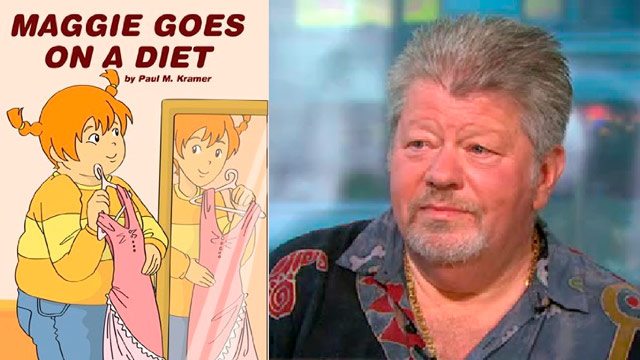The author of a controversial children’s diet book which targets children as young as four-years-old, is “amazed” by the outrage it has provoked.
Paul Kramer, the author of Maggie Goes on a Diet, has defended his independently published book about a heavily overweight 14-year-old girl who becomes a school football star after losing weight.
Kramer told Good Morning America that he was shocked by the reaction of US critics who say it may promote eating disorders and health problems in young girls.
“My idea was just to write a story to entice and to have children feel better about themselves, to discover a new way of eating, learn to do exercise, try to emulate Maggie and learn from Maggie’s experience,” he said.
The book, which is not due to be released until October, is on pre-order from book store Barnes & Noble, where it has a recommended reading age of six to 12. Amazon on the other hand, offers it to ages four to eight.
Despite the criticism, the author insists the book is about change.
“Children are pretty smart … they will make a good choice if you allow them that opportunity. If you push them and tell them that they can’t do something, they will probably go and do the opposite,” he said.
When asked why he chose to use the word diet in the title Kramer responded by saying: “Diet is a misconstrued word and it has many, many meanings.”
And despite one reader suggesting the book be called Maggie Gets Healthy instead, Kramer insisted the name remain as it would have a stronger effect.
“Somebody at a bookstore looking at a title Maggie Gets Healthy is really not going to identify with someone who has been overweight or has health problems, who can’t bend, play sports properly because they’re just too uncomfortable,” he said.
However, both Australian and US health experts don’t necessarily agree.
Professor Susan Paxton, from the School of Psychological Science at the La Trobe University in Melbourne says she has a number of serious concerns about the book.
“The word “diet” in our community is usually associated with going on a restrictive eating regime, rather than adopting healthy eating patterns. Diets of this kind are associated with the development of disordered eating patterns and in fact have been shown to contribute to long term weight gain,” she said.
“It is important that children learn healthy eating patterns but they learn this best by sharing healthy meals with their families. Parents are the best teachers and in many cases it would be valuable if parents themselves modelled healthy eating patterns for their children to follow.”
Paxton said she also had concerns that the book could encourage children to become scared of their growing bodies, rather than enjoying them.
“The book encourages the idea that a young child’s value derives from their appearance and that life’s problems can be solved with a diet,” she said.
“These beliefs lead to poor body image, low self-esteem, and sometimes serious psychological problems.”
Nutritionist emeritus at University of California-Berkeley Joanne Ikeda, said the booked focused on children’s imperfections causing lower self-esteem. She told News-Medical.net that the book ‘does not empower a child to adopt good eating habits.’
“I wouldn’t want a child to read this … because they might, in fact, try to do this and fail. What is that going to do to their self-esteem?” she said.
“Body dissatisfaction is a major risk for eating disorders in children all the way up through adulthood.”
Despite the backlash Kramer remains focused on his work.
“I was always taught as a child and all my life that you can’t judge a book by its cover,” he said.
“I think that all these people, especially that those who have written negative comments without actually reading the book, have judged this book solely by its cover.”
Your Say: What do you think about the concept of this book? Is it right or wrong? Share your thoughts below.
It brings together over 200 specialist and generalist medical and mental health professions, counsellors, support services, non-government organisations as well as those with a lived experience of eating disorders.
The workshop will provide final input to the first national strategy for ensuring the best possible plan for prevention and treatment of eating disorders. For more information visit:
For eating disorder help and free support services nationally call 1800 33 4673




